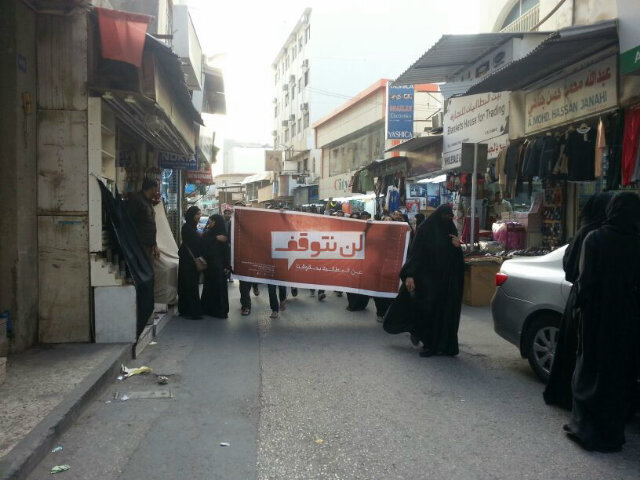Valentine’s Day and the color red symbolize love. The world over, shops and streets are decked out with red decorations, red boxes, red wrapping paper, red cards, and red roses. In Bahrain, the color red also symbolizes love, just a different kind of love. Streets there are covered in red too, the red of the blood that has been shed over the past two years. The lost lives in the fight for freedom, justice, and democracy. Red roses on the graves of loved ones who were killed by regime forces. Valentine’s Day in Bahrain, it’s a different kind of love.
14 February 2011 was not about Valentine’s Day; it was about protesting the tenth anniversary of the National Action Charter that was initiated by the self-proclaimed king in 2001. Now, as we wrap up the second year since the beginning of the uprising, the world continues to turn its back on the “inconvenient revolution.” The regime continues to oppress and commit human rights violations against peaceful protesters with legitimate demands.
For the first time since the uprising, the idea of a “national dialogue” seems to be gaining traction. The formal opposition sent representatives to participate in the dialogue that kicked off last Sunday. Not surprisingly, this came at a very convenient time to distract the world, yet again, from the impact that February 14 has had on everyday Bahrainis and their political consciousness. The second round of the dialogue was held on Wednesday, a day before the second anniversary of the uprising. While opposition leaders are holding talks about the nature of this "dialogue" and its forthcoming agenda, the streets are vibrant with relentless protesters demanding change. The alleged harmony between representatives of the opposition and those of the regime stays behind closed doors, away from the streets and its angry participants. For regime forces on the ground, it is business as usual: they use excessive force to silence voices and crush protests, deflecting media attention away from the brutal repression and towards the “long-awaited,” “constructive” national dialogue.
Hours before Valentine’s Day, thirty-five-year-old Amina Sayed Mahdi died from complications after inhaling toxic gases. On the day of love itself, a teenager lost his life to the force of lead birdshot fired by Bahraini security forces. At the time of writing, the violence continues, unabated. In Bahrain, it’s a different kind of love.
Two years on, the, brave fight for political, legal, and human rights are ongoing. They never relented. The world simply stopped listening. Today, the international community only speaks out about Bahrain in the context of “government initiatives” such as the so-called national dialogue, while failing to recognize that the Bahraini regime has no will to make any concessions, political, humanitarian, or otherwise. To quote President Obama in May of 2011: “You can`t have real dialogue when parts of the opposition are in jail.” Nor can real dialogue take place against the backdrop of continuing violence, oppression, and authoritarianism.
On Valentine’s Day, in an eternal relationship, we all have a date with Bahrain.

Protesters in Manama holding a banner that reads, “We Will Not Stop” on 13 February 2013.
(Image from Feb14 Media Network)